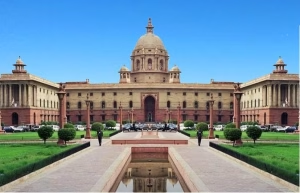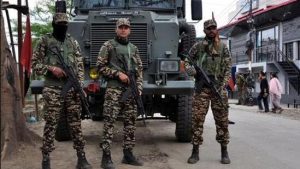New Delhi – The Ministry of Home Affairs (MHA) has announced the AFSPA Extension In Nagaland and especially in it’s 8 districts and 21 police stations across five other districts for an additional six months, effective from April 1, 2025. This decision of AFSPA Extension In Nagaland is based on a thorough evaluation of the security situation in these areas and underscores the ongoing challenges faced by law enforcement and armed forces in maintaining stability.

Background of the AFSPA Extension
The AFSPA Extension In Nagaland comes amid concerns over insurgency, organized crime, and threats to national security. The AFSPA allows the armed forces to exercise special powers in areas declared as “disturbed.” The government reviews the necessity of AFSPA periodically and determines whether an extension is required.
The districts in Nagaland where AFSPA has been extended include Dimapur, Niuland, Chümoukedima, Mon, Kiphire, Noklak, Phek, and Peren. Additionally, 21 police stations in five other districts have been brought under the purview of AFSPA for the next six months. These areas have seen sporadic incidents of violence and insurgency, necessitating stringent security measures.
Security Concerns Leading to the Extension
The primary reason for the AFSPA Extension in Nagaland is the persistent security challenges in the region. The presence of insurgent groups has contributed to instability, and law enforcement agencies have struggled to contain these elements effectively.
Authorities argue that the special powers granted under AFSPA enable security forces to take decisive action against armed groups and prevent further escalation of violence. Despite ongoing peace talks and negotiations, certain factions continue to operate in ways that pose risks to public safety. The Act is seen as a necessary tool to counter such threats.
What is AFSPA?
The Armed Forces (Special Powers) Act (AFSPA) was enacted in 1958 to empower security forces operating in disturbed areas. The Act grants special powers to the armed forces, allowing them to maintain law and order in regions affected by insurgency and unrest.

Key Provisions of AFSPA:
- The Act allows security personnel to use force, including lethal force, if necessary, to maintain public order.
- It grants the power to arrest individuals without a warrant based on suspicion of unlawful activity.
- Security forces can search premises without prior approval and seize materials suspected to be used for insurgent activities.
- The Act provides immunity to security personnel, ensuring that no legal proceedings can be initiated against them without prior approval from the central government.
While AFSPA is intended to address security threats, it has also faced criticism from human rights groups who argue that it has led to cases of abuse and excessive use of force.
Also Read: Amit Shah Slams RJD in Patna Visit 2025: Exposes Past Governance Failures
Historical Context and Controversy
AFSPA has been a subject of debate since its inception. While the government maintains that the Act is essential for combating insurgency, critics argue that it has been misused, leading to allegations of human rights violations. There have been calls for either repealing or amending the Act to ensure better accountability and oversight.
Several committees and reports have examined the impact of AFSPA, with some recommending its repeal or modification. However, successive governments have upheld its necessity, citing the volatile security situation in regions where the Act is enforced.
Impact on Civilian Life
The AFSPA Extension in Nagaland will also have many significant implications for civilians living in the affected areas. The presence of armed forces and the special powers granted to them create an environment of heightened security, which can sometimes lead to restrictions on movement and daily activities.


Residents have expressed mixed reactions to the AFSPA Extension in Nagaland. Some support the measure, believing it is necessary to curb insurgent activities and maintain stability. Others are concerned about potential human rights violations and the lack of legal recourse in cases of alleged misuse of power.
The government has assured that measures are in place to prevent misuse of AFSPA and that security forces are instructed to operate with restraint. However, concerns remain, particularly among local communities and human rights organizations.
The Government’s Stance


The government has reiterated that the AFSPA Extension in Nagaland is a temporary measure, necessitated by security considerations. It has stated that periodic reviews are conducted to assess the situation, and the ultimate goal is to restore peace and normalcy, allowing for the withdrawal of the Act when conditions improve.
Efforts are ongoing to bring stability to the region through negotiations and development initiatives. The government has also encouraged dialogue with various stakeholders, including local leaders and civil society organizations, to address concerns related to AFSPA and its implementation.
The Path Forward
The future of AFSPA in Nagaland remains uncertain, with the AFSPA Extension in Nagaland dependent on the evolving security situation. While the government and security agencies emphasize the need for strong measures to combat insurgency, there is also a growing demand for a more balanced approach that considers human rights and community welfare.
One possible approach except AFSPA Extension in Nagaland, is the gradual withdrawal of AFSPA in phases, as security conditions improve. This has been done in certain areas in the past, where reduced insurgent activity allowed for the lifting of the Act. However, such decisions require careful assessment to ensure that law and order are maintained.
Another potential reform is introducing greater accountability mechanisms for security forces operating under AFSPA. This could include independent oversight bodies to investigate complaints of misuse and ensure that security operations adhere to human rights standards.
Closing Remarks
The AFSPA Extension in Nagaland highlights the ongoing security challenges in the region. While the Act grants necessary powers to security forces, it also raises concerns about civil liberties and human rights. The debate over AFSPA Extension in Nagaland reflects the broader struggle between maintaining security and upholding democratic values.
As discussions continue on the future of AFSPA, it is crucial to strike a balance between ensuring effective law enforcement and protecting the rights of citizens. Finding a long-term solution that addresses the root causes of insurgency while respecting human rights will be essential for lasting peace in Nagaland and other affected regions.

